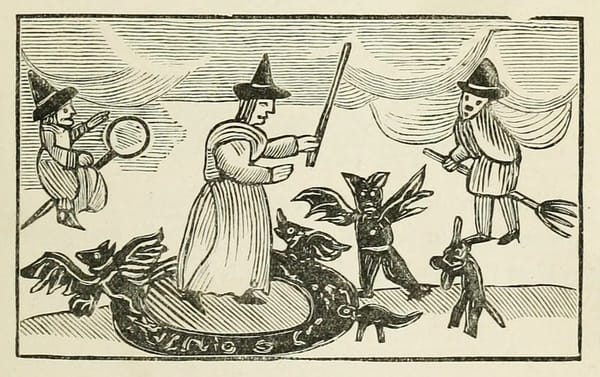Note 6: Cosmic horror
On being too stupid to recognize the magnitude of our insignificance.
PHEW!
Remind me to not tell anyone else that things are on a manageable pace and there’s not a lot that can distract or otherwise ruin my focus. Last Thursday I made a remark that since my mail-in ballot was sent in (and confirmed as being received by the local board of elections), I could be moderately successful tuning out of politics and getting things done.
Then the Trump-COVID circus came to town to demonstrate that I was a liar.
Holy cow, October Surprises in 2020 are something else. I’ve been working very hard to not be constantly refreshing CNN and other news sources to find out what’s going to happen next. I’m going to leave it at that, lest this newsletter become a novella on Trump’s stupidity that surpasses anything you’ll find on the Play Stupid Games, Win Stupid Prizes sub-Reddit. (Visit at your own peril.)
My morning had an October surprise of its own as I woke up to a client informing me that they were planning on enrolling some participants in a study at 2:30pm (Central European Time), without having first informed me that they were happy with the system and were ready to go. It was a pretty mad scramble this morning shifting from testing mode to production mode - including uploading their new app to the Google Play Store - but that rapid deployment appears to have gone well, and I compressed a couple of days’ labor in the future into a few frantic hours before my regular Wednesday call-a-thon began in earnest.
So, I’m coming down from that flight-or-fight situation, and I’m looking forward to relaxing this evening with the Vice Presidential debates. I don’t have any predictions to make other than I will be very surprised if it’s anywhere approaching the… checking my local CNN dictionary… shitshow we were all showered with last Tuesday.
Then again, it’s October, and my limited human imagination is likely blinding me to the malevolence that this month still has in store for all of us.
Cosmic horror
Limited human imagination brings me to this week’s main topic - cosmic horror. Since it’s October, and I’m a horror fan, I figured that I would take a tour down Horror Lane and use this space to talk about my favorite punk-rock film and literary genre. Folks who know me know that last decade, I fell down the rabbit hole of H.P. Lovecraft’s literary corpus, built an app around it, and also managed to do some original semi-scholarly research around the status of his literary estate. I’m a regular attendee of NecronomiCon Providence, and generally dig the Lovecraft Mythos.
Lovecraft is often credited with inventing the cosmic horror genre and I think the best description of what he is writing about comes from the opening pages of 1928’s The Call of Cthulhu:
The most merciful thing in the world, I think, is the inability of the human mind to correlate all its contents. We live on a placid island of ignorance in the midst of black seas of infinity, and it was not meant that we should voyage far. The sciences, each straining in its own direction, have hitherto harmed us little; but some day the piecing together of dissociated knowledge will open up such terrifying vistas of reality, and of our frightful position therein, that we shall either go mad from the revelation or flee from the deadly light into the peace and safety of a new dark age.
Lovecraft’s innovation in the horror genre was abandoning the Manichean duality where Good battles against Evil in stories like Stoker’s Dracula, and replacing that structure where people fear their irrelevance to the beings that actually matter. The difference between Cthulhu (in his popular modern incarnation) and Satan is that Satan actually cares about stealing your immortal soul from the Almighty, whereas Cthulhu couldn’t care less. In the classic dualist horror setup, you’re the prey for a monster that’s hunting you. In the classic cosmic horror story, you’re less than the tiniest krill shrimp that has no choice in whether it’s devoured by the whale that’s just going about its business.
Lovecraft and other cosmic horror writers highlight man’s insignificance by drastically expanding the scope of the storytelling both spatially and temporally. Classic horror was told on a set that might just be a house, town, or local countryside. Cosmic horror happens on the scale of eons, galaxies, and dimensions. In The Shadow Out of Time, our Lovecraftian protagonist (an economics professor) finds his mind transported into an alien body millions of years in the past. There, he spends his time reading and studying available texts, while an alien mind animates his body in the present:
Only after weeks of hideous repetition did I grow half-reconciled to these visions of myself in monstrous form. In the dreams I now moved bodily among the other unknown entities, reading terrible books from the endless shelves and writing for hours at the great tables with a stylus managed by the green tentacles that hung down from my head.
Snatches of what I read and wrote would linger in my memory. There were horrible annals of other worlds and other universes, and of stirrings of formless life outside of all universes. There were records of strange orders of beings which had peopled the world in forgotten pasts, and frightful chronicles of grotesque-bodied intelligences which would people it millions of years after the death of the last human being.
I learned of chapters in human history whose existence no scholar of today has ever suspected. Most of these writings were in the language of the hieroglyphs; which I studied in a queer way with the aid of droning machines, and which was evidently an agglutinative speech with root systems utterly unlike any found in human languages.
Other volumes were in other unknown tongues learned in the same queer way. A very few were in languages I knew. Extremely clever pictures, both inserted in the records and forming separate collections, aided me immensely. And all the time I seemed to be setting down a history of my own age in English. On waking, I could recall only minute and meaningless scraps of the unknown tongues which my dream-self had mastered, though whole phrases of the history stayed with me.
Cosmic horror is the horror of futility. It cuts when it reminds you that you do not matter. More often than not, the Lovecraftian protagonist exits the story mentally broken or dead by their own hands. Insignificance suffocates those who recognize it.
Given its cosmic scale, this kind of horror often overlaps with science fiction, and for someone seeking to write in this tradition, the cosmic threat has to scale with humanity’s advances in science and technology. Yuggoth and its Mi-Go decrease in threat as mankind sends probes to map the dark planet’s surface. Good writers find ways to scale that horror and none have done better at that than China’s Liu Cixin in his series Remembrance of Earth's Past. In those three volumes, Liu introduces a modern humanity that discovers the answer to the Fermi Paradox when it first meets a fellow extra-stellar civilization.
If you’re unfamiliar with the Paradox, it builds upon the Drake Equation, which posits that the universe should be teeming with civilizations if you take the probability of various preconditions that must be met for life to emerge and multiply it by cosmic-scale numbers. Fermi’s question for Drake is then, where are they?
In Liu’s second novel, he introduces the concept of the Dark Forest:
The universe is a dark forest. Every civilization is an armed hunter stalking through the trees like a ghost, gently pushing aside branches that block the path and trying to tread without sound. Even breathing is done with care. The hunter has to be careful, because everywhere in the forest are stealthy hunters like him. If he finds other life — another hunter, an angel or a demon, a delicate infant or a tottering old man, a fairy or a demigod — there’s only one thing he can do: open fire and eliminate them. In this forest, hell is other people. An eternal threat that any life that exposes its own existence will be swiftly wiped out. This is the picture of cosmic civilization. It’s the explanation for the Fermi Paradox.
The Dark Forest arises on a cosmic scale, because communication between two first-contact civilizations is not likely to be successful and odds are very good that encountering another technologically-advanced civilization will highlight a technological disparity between the two. And since neither civilization knows (pre-contact) whether it comes up on the better end of that comparison, the only rational game-theoretic reaction to encountering another species is to exterminate it before it has a chance of exterminating you. In Liu’s galaxy, to broadcast your presence is to invite annihilation, so keep your head down and don’t make any noise that would attract attention.
Good cosmic horror is great stuff that expands your brain when written properly. In addition to Lovecraft and Liu, some other solid works in that tradition:
- A Colder War (Charles Stross)
- The Southern Reach Trilogy (Jeff Vandermeer)
- The Adversary Cycle (F. Paul Wilson)
- Declare (Tim Powers)
In addition to the authors and works above, there’s an extremely active community of short-fiction authors writing in the cosmic horror tradition. I’d suggest visiting The Lovecraft Reread at Tor.com and checking out some of the later entries after Emrys and Pillsworth finished recapping Lovecraft.
Other October 2020 Notes on Horror: Liminal Horror, Folk Horror.
Local updates
My spacefaring has been put on temporary hiatus due to software bugs. I haven’t spent much time in Elite due to timeout issues that began cropping up about a month ago. I’ve been working with Frontier’s technical support to try and find the cause, and the issues have been escalated up the QA chain. On Friday, I also gave Star Wars: Squadrons a spin in VR. It was a decent experience until the audio cut out mysteriously. I’ve paused my playing until that gets resolved.
Around the house, I’ve been on a tear with home improvement stuff, trying to get everything fixed and in order before winter sets in. This includes windows, our roof, and some other improvements for the HOA. That’s been keeping me pretty busy.
On my commute to and from the office, I’ve been enjoying the latest entry in the recently-resuscitated Dresden Files series (which includes some minor cosmic horror elements). It’s not everyday that you get to read a details description of how your neighborhood gets systematically destroyed by an angry proto-god.
Occupational updates
The upgrades in my aging tech stacks continues to be theme of my job in unexpected ways. Overall, the upgrades are going well, but I’m struggling with managing expectations for myself and with my clients. They don’t see major changes in what they use and I’m lagging on being able to do new development, but we all knew that this pill to swallow was coming. It’s just not pleasant going down.
Interesting reads
Star Wars: Squadrons review: a triumph of focused design and succinct storytelling (Polygon)
Nobel Prize in Physics Awarded to 3 Scientists for Work on Black Holes (New York Times)
May your jumps be Thargoid-free, CMDRs! o7



